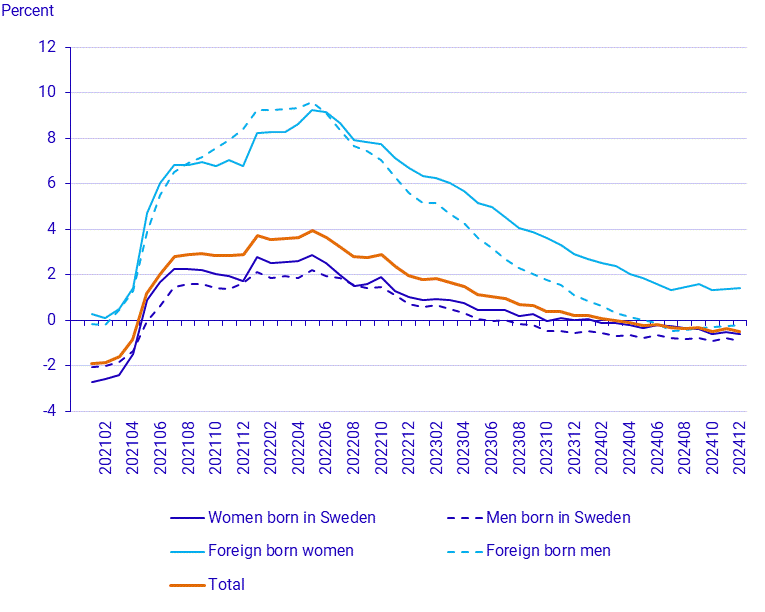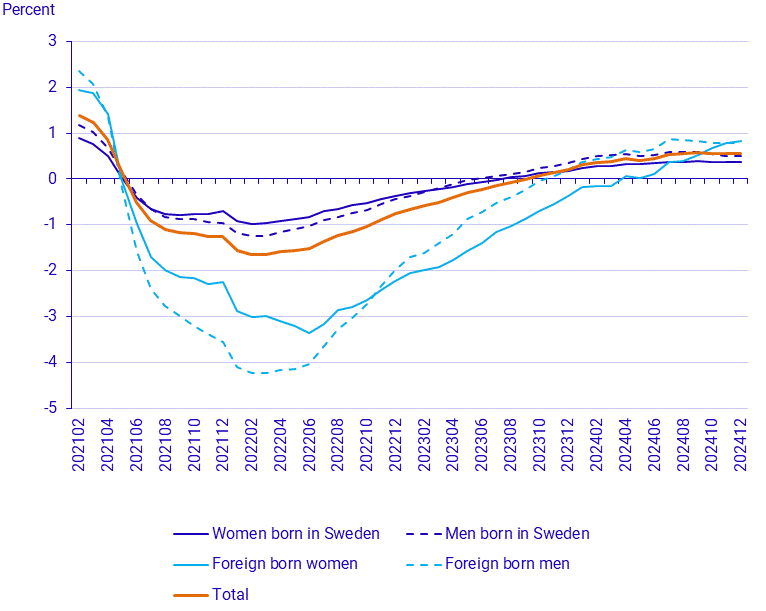Population by Labour market status, December 2024
The labour market remained subdued in December 2024
Statistical news from Statistics Sweden 2025-02-28 8.00
People in employment aged 15 to 74 numbered 5 168 000 in December in 2024. This is a decrease of 24 000 people compared with December 2023. In the 20 to 65 age range, 289 000 people were unemployed. This equals a share of 5.7 percent expressed as a percentage of the labour force and is an increase of 0.6 percentage point compared with the same period of the previous year.
People in employment
The number of people in employment aged 15 to 74 decreased in December by 0.5 percent compared to the same period the previous year, but the trend varies depending on sex and region of birth.

The unemployed
The number of unemployed people aged 20 to 65 in December was 289 000, which is an increase of 29 000 compared to the same period the previous year.
The relative unemployment rate - the proportion of unemployed people in relation to the labour force - was 5.6 percent for women and 5.8 percent for men. This equals an increased unemployment rate among woman of 0.5 percentage point, and 0.6 percentage point among men compared with the same period of 2023.
Unemployment is higher among foreign born people than among those born in Sweden. In December the unemployment rate was, among foreign born people 12.6 percent and among people born in Sweden 3.3 percent.

| December 2024 | November 2024 | December 2023 | Change since December 2023 (%) |
|
|---|---|---|---|---|
| Employed | 5 168 000 | 5 160 000 | 5 192 000 | ‑0.5 |
| Women | 2 519 000 | 2 512 000 | 2 523 000 | ‑0.2 |
| born in Sweden | 1 960 000 | 1 954 000 | 1 972 000 | ‑0.6 |
| foreign born | 559 000 | 558 000 | 551 000 | 1.4 |
| Men | 2 650 000 | 2 648 000 | 2 669 000 | ‑0.7 |
| born in Sweden | 2 037 000 | 2 035 000 | 2 055 000 | ‑0.9 |
| foreign born | 612 000 | 613 000 | 613 000 | ‑0.2 |
| December 2024 | November 2024 | December 2023 | Change since December 2023 |
|
|---|---|---|---|---|
| Employed | 4 800 000 | 4 796 000 | 4 821 000 | ‑0.4 |
| Women | 2 336 000 | 2 333 000 | 2 340 000 | ‑0.2 |
| Men | 2 464 000 | 2 464 000 | 2 481 000 | ‑0.7 |
| Employment rate (%) | 78.8 | 78.7 | 79.4 | ‑0.6 |
| Women | 78.3 | 78.2 | 78.9 | ‑0.5 |
| born in Sweden | 83.1 | 83.0 | 83.5 | ‑0.4 |
| foreign born | 65.6 | 65.6 | 66.1 | ‑0.5 |
| Men | 79.2 | 79.2 | 79.9 | ‑0.6 |
| born in Sweden | 82.7 | 82.6 | 83.3 | ‑0.6 |
| foreign born | 69.9 | 70.0 | 70.5 | ‑0.6 |
| Unemployment | 289 000 | 286 000 | 260 000 | 11.1 |
| Women | 138 000 | 137 000 | 125 000 | 11.1 |
| born in Sweden | 52 000 | 52 000 | 45 000 | 15.2 |
| foreign born | 86 000 | 86 000 | 79 000 | 8.8 |
| Men | 151 000 | 148 000 | 135 000 | 11.2 |
| born in Sweden | 75 000 | 73 000 | 65 000 | 14.6 |
| foreign born | 76 000 | 75 000 | 70 000 | 8.0 |
| Relative unemployment rate (%) | 5.7 | 5.6 | 5.1 | 0.6 |
| Women | 5.6 | 5.6 | 5.1 | 0.5 |
| born in Sweden | 2.8 | 2.8 | 2.4 | 0.4 |
| foreign born | 13.9 | 13.8 | 13.0 | 0.8 |
| Men | 5.8 | 5.7 | 5.2 | 0.6 |
| born in Sweden | 3.8 | 3.7 | 3.3 | 0.5 |
| foreign born | 11.5 | 11.3 | 10.7 | 0.8 |
| December 2024 | November 2024 | December 2023 | Change since December 2023 (%) |
|
|---|---|---|---|---|
| Students | 180 000 | 198 000 | 167 000 | 7.7 |
| Women | 102 000 | 113 000 | 95 000 | 7.4 |
| Men | 78 000 | 85 000 | 72 000 | 8.2 |
| Retirees | 73 000 | 76 000 | 81 000 | ‑9.4 |
| Women | 36 000 | 37 000 | 40 000 | ‑10.2 |
| Men | 37 000 | 38 000 | 40 000 | ‑8.6 |
| Sick | 229 000 | 229 000 | 228 000 | 0.2 |
| Women | 126 000 | 126 000 | 126 000 | ‑0.1 |
| Men | 103 000 | 103 000 | 102 000 | 0.7 |
| Others | 522 000 | 507 000 | 517 000 | 0.9 |
| Women | 244 000 | 235 000 | 242 000 | 1.0 |
| Men | 278 000 | 272 000 | 275 000 | 0.8 |
Definitions and explanations
BAS, Population by Labour market status, presents statistics based on administrative data concerning aspects such as number of people in employment, unemployed people, and people outside the labour force for the registered population aged 15 to 74. The statistics can be used to describe current status, but also the progression over time. It illuminates both the entire population and smaller groups, such as detailed age groups at the municipal level.
The statistics contain estimates of the number of people broken down by labour market status: Employed, unemployed, student, retiree, sick and others. The definition of labour market status is hierarchical, which means that a person can only be assigned one labour market status, and it is determined according to the order of precedence above.
The labour force consists of employed people and the unemployed.
The labour market status categories that are outside the labour force are student, retiree, sick and others. There are fewer people outside the labour force in the summer than during other parts of the year. This is mainly because some people who are students during term time work during the summer and are then classified as employed.
Feel free to use the facts from this statistical news but remember to state Source: Statistics Sweden.
